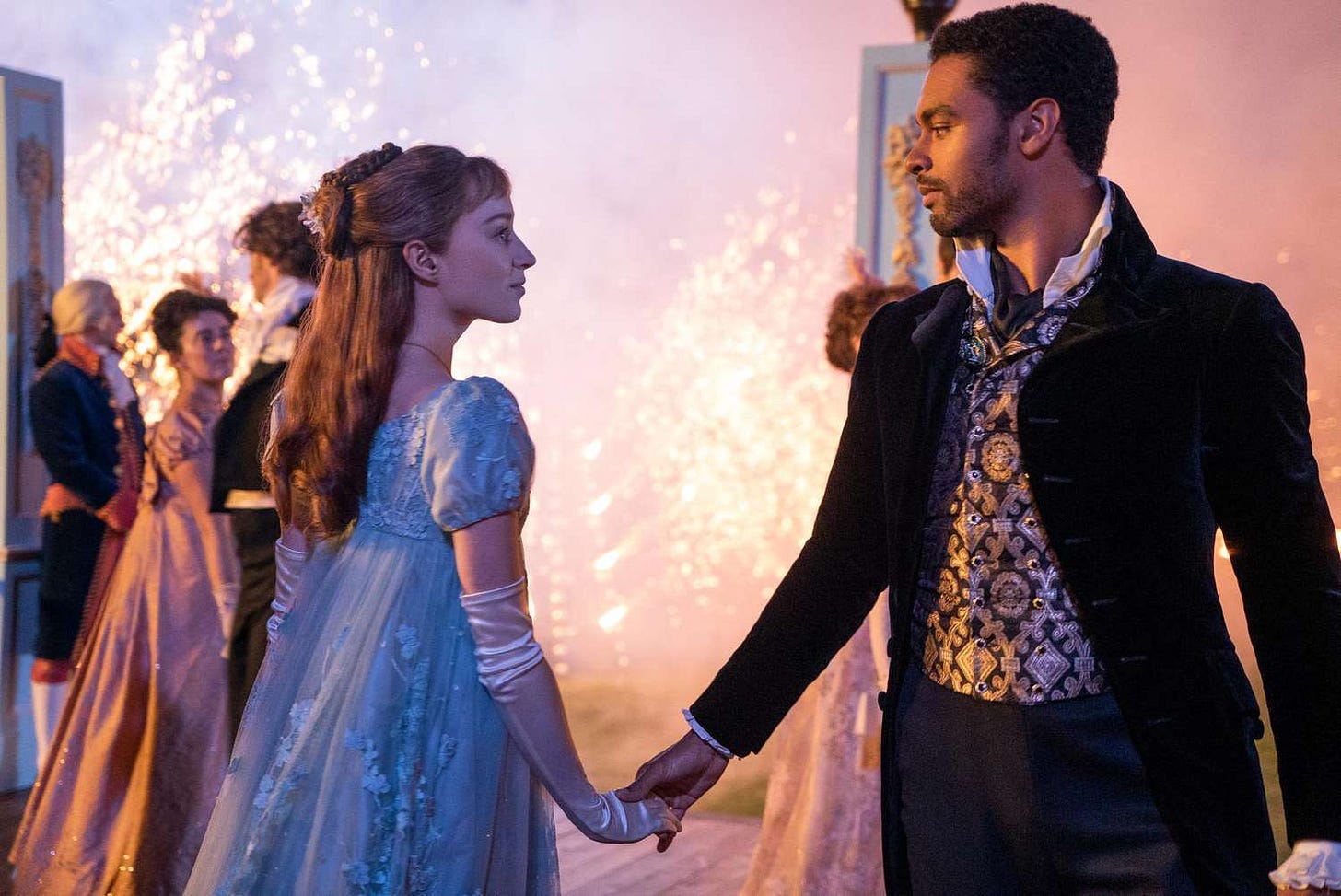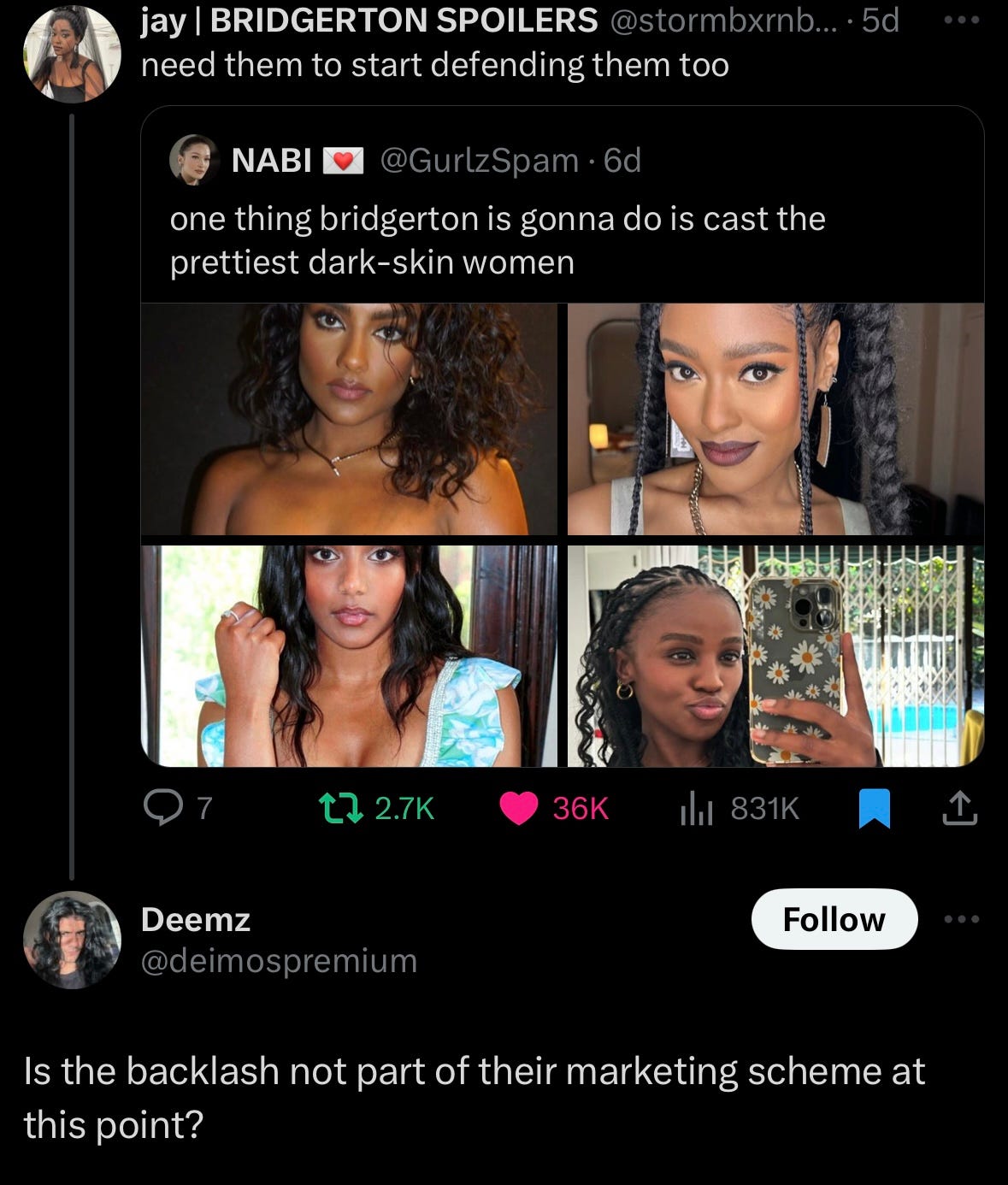The current problem with representation In Hollywood.
On “Bridgerton”, and how fandoms affect perception.
Fandoms and Fan bases of TV shows, movies, books, artists, etc. have existed since even before social media technology was large and fully established but despite that certain pieces of these mediums usually cater to certain demographics of people due to those demographics flocking to spaces for different reasons that resonate with them like representation, life experiences, etc. But what happens when a medium is adapted in a different form to reach a different, and or larger demographic of people?
…Not a safe space for any and every minority involved, is the answer. And a prime example that exudes this case currently in the entertainment industry is Netflix’s “Bridgerton”. Personally, I love my fair share of tea parties, croquet, pretty gowns, and orchestral arrangements but, Bridgerton does almost the exact opposite of what it was originally intended to do as a “more diverse” “color-blind” period piece. Which is, instead of blurring the line between race and realism, it rather solidifies the unwavering gap between how white viewers see society and treat minorities without even noticing it—and how viewers and actors of color are put in the position to realize that we cannot readapt regency era content for the tea parties, games of pall-mall, pretty gowns, and aesthetical attributes that we don’t see in society today. Because there will always be white extremist ideologies waiting at the end of the day, to bitter the sweetness for which escapist media was meant for.
After, and even before the releases of each season of the romantic, climactic, drama series, the internet has been hit with racist, colorist, and even homophobic analyses’, think pieces, comments, hate trains, behaviors, etc., in response to characters that are not printer-paper plain existing in a universe that was once nothing but that. Before season 1 of the book-adapted show was released, Netflix announced that the series would be “color-blindly” cast in an attempt to reach, and engage with a larger audience with black producer Shonda Rhimes at the forefront. Still, as soon as the lead love interest of the season was announced to be portrayed by a black actor, It enraged fans of the book and even caused them to make the hashtag “Not my duke” trending to convey the fact that they simply couldn’t stand seeing Regé-Jean Page take the role of their beloved, presumably white, leading man. The impact of this continued even after the release of the show's first season until the end of its promotion and even until now, almost four years later.
Via Netflix
Regé-Jean Page left the show after one season, that season only being the first, and unfortunately, he wouldn’t be the last member of the Bridgerton cast to leave the show, or even the last cast member to leave the show after being mocked and undefended. According to The Tab, a source close to the show told The Hollywood Reporter that Page was given a chance to return as a guest star in a few episodes of season two, but declined for “a multitude of reasons”, and that source told Page Six: “Regé is not coming back to Bridgerton because of creative differences with Shonda Rhimes and her team,” understandably. Simone Ashley who plays the female lead, Kate Sharma of Bridgerton season two, dealt with similar online backlash in response to her playing a previously white character as (all characters were) portrayed in the books. In an interview for British Vogue Ashley stated, “ [Jonathan Bailey] would be like, ‘Are you ready for your life to change?’ I was in denial. Later on, I remember bumping into Regé-Jean Page at the Vanity Fair Oscar party, and he said, ‘Give it three to five months. You’ll notice a difference.’ He was right.”
Whether change can be for better or for worse, or most likely both, In an interview about Ashley’s newly established production company “Good Catch Entertainment” She stated, “I set it up when I got Bridgerton. The more you work in the industry, you see the holes…what shouldn’t be happening. I want to create sets where everyone feels equal. I don’t want to be put in a certain box. I want to be in the driver’s seat.”
This statement and action to create a space where people can feel equally represented and more importantly comfortable post her first time in Bridgerton emphasizes how important not only just throwing representation out there is, but making the call to action to protect those who are the representation, not shunning them out and accentuating how these spaces aren’t as “color-blind” as they claim in the process. In an interview with People Magazine about Bridgerton season 3 when Simone Ashley was asked about what advice she’d give to Masali Baduza who plays Michaela Stirling she said, “I think to be just deeply proud about what you're representing, and [know] that many people are going to be so seen by the story that you're going to be telling,” “I think this is what the world needs more of, more representation.”
And Ashley’s statement is 100% right, and that impact always shows. Young south-Indian actress Avantika said for Cosmopolitan that Bridgerton was the first time she had ever felt properly represented in Hollywood, and that “The South Indian women who do reach insane levels of success in India are very light-skinned—some have become lighter skinned. So seeing myself represented in Bridgerton season 2’s Charithra Chandran and Simone Ashley—beautiful, dusky-skinned women—South Indian women— in Hollywood has made me so, so happy.”
The sole purpose of a TV show based on the idea and characters of Julia Quinn’s novel series was to adapt the characters and bonds among it while also creating a universe in which all viewers could feel comfortable, strongly about, and benefit positively from being within it while putting a twist on the traditional regency drama. But, when you decide to adapt from an author who has stated in person that she, “Doesn’t write books with black characters because she doesn’t write struggle”, with themes of colonization, sexual assault, etc. It seems almost inevitable that you would also be catering to an almost opposite audience than intended among the audiences of other races, ethnicities, sexualities, etc, that could possibly make or break the way that the show is perceived because of that fanbase, and also how your actors and fans of color are treated.
As for a show that continues to promote by using its diversity, it constantly lacks in actually doing what comes with being just that. Within the four years that Bridgerton has been airing Shonda Rhimes and Shondaland has consistently failed its actors in simply leaving them to sit in no defense from the never-ending racist and homophobic verbal abuse towards their cast, and then have white fans tell viewers of color online that they’re “overthinking” “over-complicating” and “throwing around homophobia and racism cards” Because they don’t get to see themselves in every character portrayed in the show…when they already have most of the cast to do that with.
Via Netflix
As a black and queer teenage girl, even with characters that I can feel represented by, there’s a certain point that it gets to where it just falls flat. Being excited about something and then going on social media to see that people are enraged over that exact subject and seeing no one within its production stand up against it—makes it feel as one-dimensional as it is.
Representation only really matters to executives when it brings in heaps of money, but making that evident to such a mass audience, including young viewers, creates the biggest sense of false hope, even for their own actors—pushing them to create their own spaces that in return are more welcome. So much so that in this I didn’t even get to cover EVERY problem and gripe that I have with this conversation. But I think despite that, I’m somewhat excited to see the future of the Bridgerton series, what has come out of it, and where it will go, while still acknowledging that it’s nowhere near the ideal romantic fantasy that everyone can escape to—because almost no show can do that. Yet, there has not been a single season of Bridgerton that has passed without audiences being blatantly oppressive, and not a single season that has passed where Netflix and Shondaland has attempted to combat it. In the words of Charithra Chandran, “The oppressors have imposed the idea that there’s only one seat at the table, when what other people of color are doing is just pulling up more chairs.”








